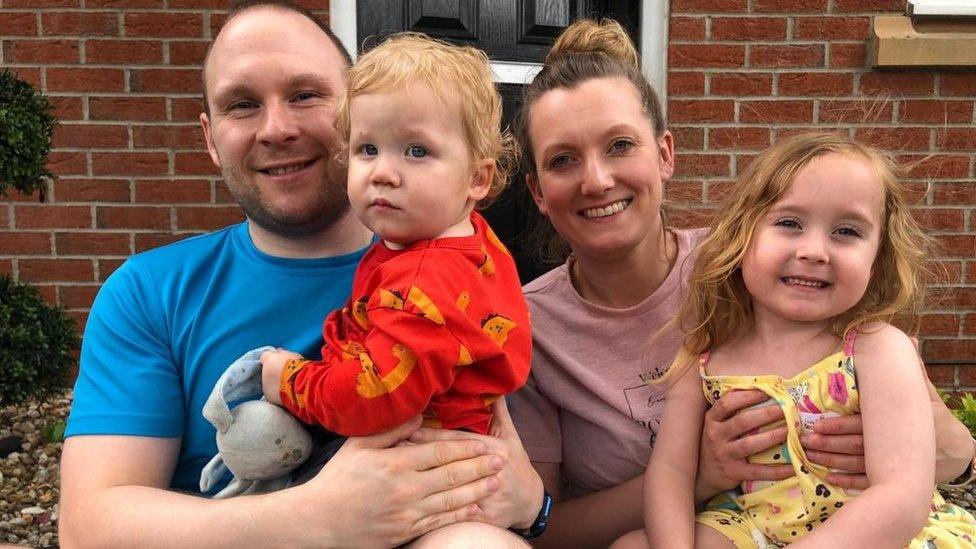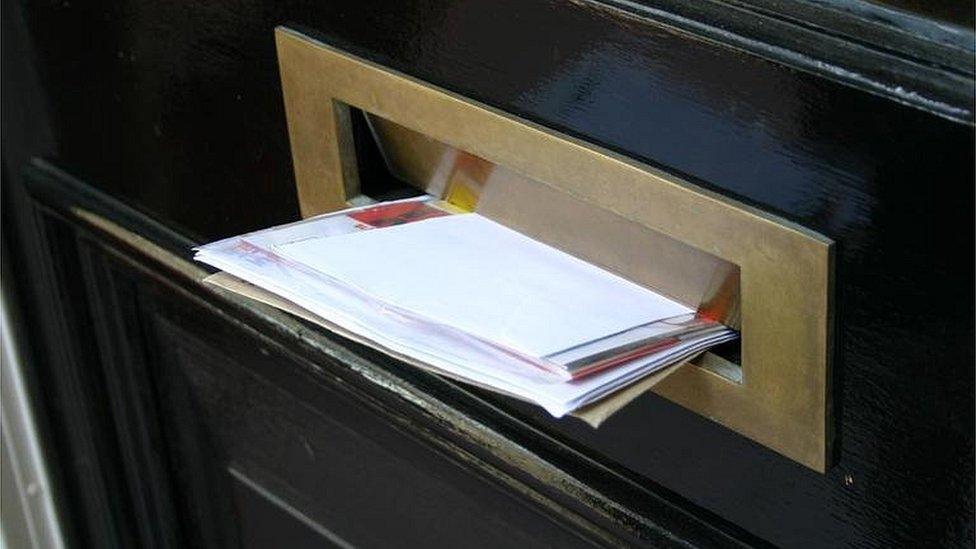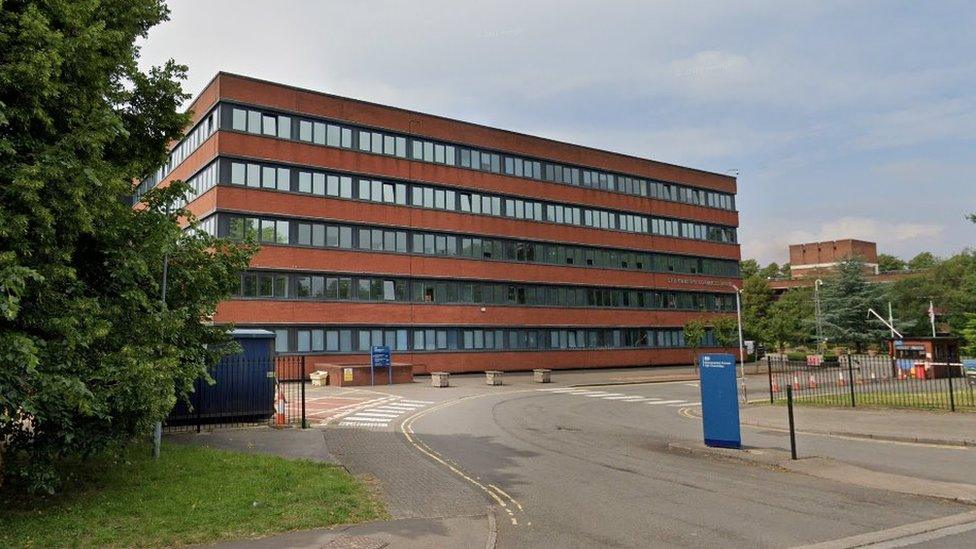Bogus companies scam: 'We never knew our home was on the list'
- Published

Kay and Ben live on an Oldham street where almost every resident has been targeted by the scam
Thousands of households have had their addresses unknowingly used by crime gangs to register bogus companies, a BBC investigation has revealed.
BBC Radio 4's You and Yours found about 150,000 had been registered and in some streets, every home had been targeted.
The residents have then had to deal with overdrafts, loans, insurance demands and credit card debts.
A Companies House spokesman said there were currently "no legal powers to verify or validate" a firm's details.
Most of those affected have been targeted by organised crime gangs, who have registered companies at addresses across the whole of the UK.
The homeowners only found out when post from Companies House, HMRC and banks arrived addressed to the businesses.
'Purposely done'
One street in Oldham saw companies set up at almost all the addresses on a single day.
They all had cleaning, build, construct or deliver in the title, they all had a single director and they were all set up on 27 May this year.
Kay and Ben, who live on the street, said they first started to get letters from various parties about a company at their address by the end of May.
Kay said she had "rung every single one of them and said this company is not at this address", but had not yet heard if any details had been changed by those sending out the letters.
She said she was told to report it to Companies House, but that agency had written to her to inform her that those who had registered the firm would be given 28 days to object before her address was removed.
"We've lived in this house since it was built, so we know full well that this hasn't just been a mistake," she said.
"This had been purposely done."

David, from Oxford, began to worry when he started receiving letters addressed to a name he did not recognise
One of their neighbours, who asked to remain anonymous, said she had had letters about more than one company being registered to her address.
"I had two letters from Inland Revenue, which I put back in the postbox with 'not at this address' on and I had four from Companies House," she said.
"Companies House made me fill in a form, which was a load of rigmarole, and I'm still waiting to hear from them.
"I just sent them a council tax bill and hoped that was enough."
'They kept coming'
David, who lives in Oxford, was similarly targeted.
He said he began to worry when he started receiving letters addressed to a name he did not recognise.
"We started returning them with 'not known at this address', but they kept coming," he said.
He said the company director named on the letters then received documents from Companies House, correspondence from HMRC "and then offers of bank accounts from finance companies that have not done any checking for money laundering or fraud".
A search of the Companies House website revealed his neighbours had also had their addresses used to register bogus firms without their knowledge.
David said he was "horrified" at the extent of the scam, adding: "It did seem to me that the rules that Companies House operates under would encourage huge numbers of these."
He added that Companies House needed to change "their basic rules and check the legitimacy of a company's registered address" and start to take immediate action whenever a problem is identified.
'Wrong way round'
The process of registering a company is a straightforward one, as it costs £12 to register a firm and takes about 20 minutes.
Usually, the company will be able to operate within 24 hours and there are no checks on who has made the registration.
Financial crime expert Graham Barrow said it was "quite hard to describe how bad and how enormous this problem is".
He believes about a fifth of all the companies set up in the UK in the last year were fraudulent.
All of them have one thing in common; no economic value.

A spokesman said Companies House was aware of the issue and "recognises the difficulties faced by those affected"
He said they were being set up to fleece either banks or government institutions such as HMRC, and leaving innocent homeowners with bills they could never have seen coming.
"It's a common misunderstanding that people think Companies House is some sort of regulated government organisation," he said.
"It's a register which was set up in 1844 to be a register of companies and it has absolutely zero mandate to do any checking on any of the information."
He said the current system was "madness" and "completely the wrong way round".
"It should be check on the way in, not on the way out.
"I know it is only £12 [to register], but it's a lot of time and effort and people don't do that for the sake of their health, they're doing it for a very specific and criminal reason."

If you have been affected by this scam and would like to share your story, contact You and Yours by email at youandyours@bbc.co.uk, external.

The Companies House spokesman said it carried out checks to ensure filings were complete, but "at present, the Registrar of Companies has no legal powers to verify or validate the information which is delivered to her".
"Provided a document appears to meet the requirement to be properly delivered, the Registrar must register it," he said.
He said Companies House was aware of the misuse of the register and "recognises the difficulties faced by those affected by this".
"Where potential criminal activity is identified, Companies House works closely with law enforcement agencies to refer matters and support investigations," he said.
He added that to help tackle this type of abuse, the government had recently consulted on "significantly enhancing the role and powers of the Registrar" and had "published a White Paper outlining reforms, external".
"In combination, they will significantly strengthen the Registrar's ability to know who is forming and running companies and will allow her to query information companies send her where she has reason to believe it is suspicious, misleading or fraudulent," he said.
A Department for Business, Energy and Industrial Strategy spokesman said the UK had "some of the strongest controls in the world to combat money laundering, and it's vital that we continue to upgrade our governance to crack down on criminals".
He said the forthcoming Economic Crime and Corporate Transparency Bill would help to "prevent fraudulent appointments by introducing identity verification" and give Companies House powers to "check, challenge and decline any dubious information".
He added that the changes would ensure "any fraudulent addresses can be struck off" and "relieve householders whose addresses have been hijacked from suffering further through a lengthy administrative or court process".

Shari Vahl's full report is on You and Yours on BBC Radio 4 and BBC Sounds from 12:00